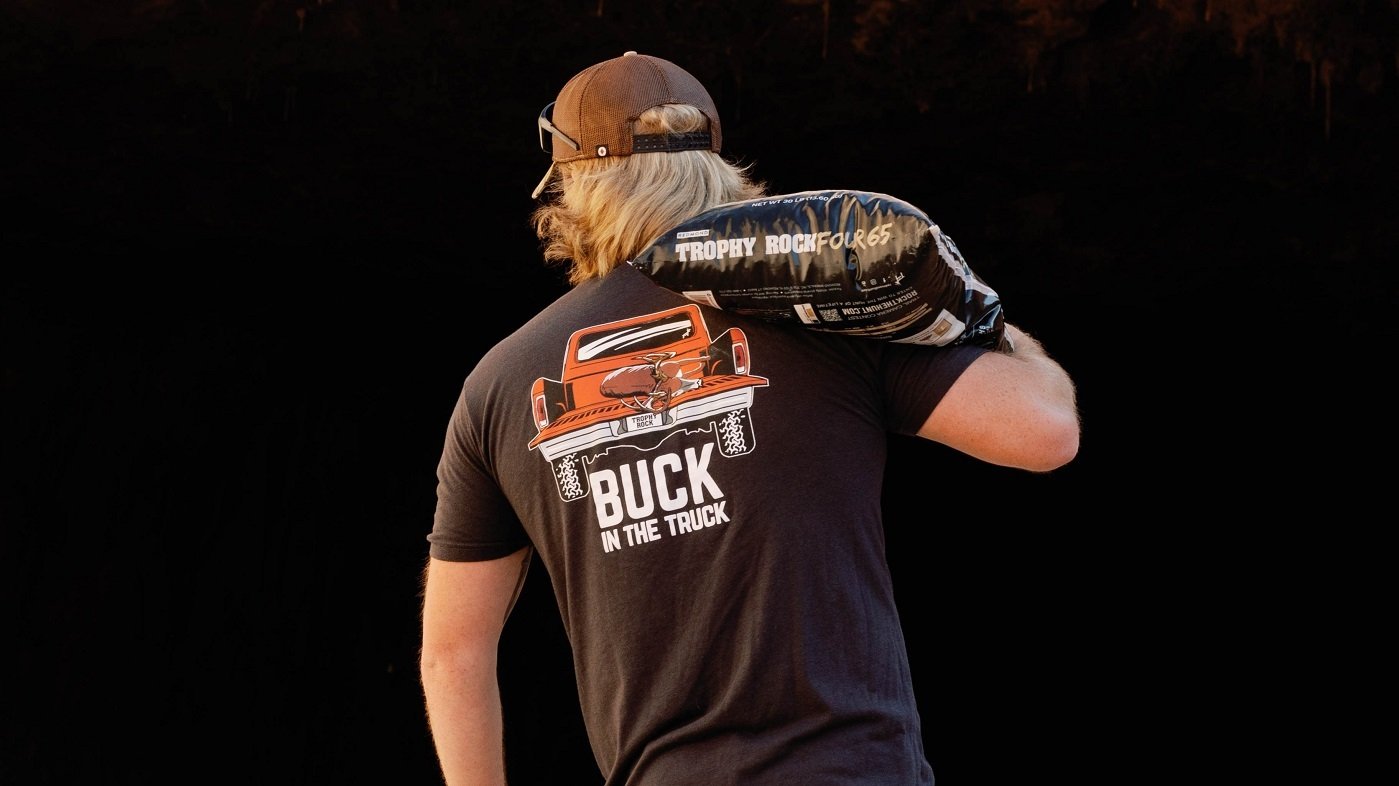Redmond Hunt Blog
Start Hunting with Kids: When and How to Take a Child Hunting
Redmond Hunt August 30, 2023
Do you want to take kids hunting, but not sure when or how to start? Here are three ways to prepare a child for hunting and lessons they can learn.
As the cooler weather sets in, much-anticipated fall hunts begin. It’s the season for brisk mornings, crunchy leaves, gearing up, and finally wrangling in that big buck—and maybe a kid or two.
Do you have plans to take a kid hunting this fall? There's a special kind of magic, and responsibility, in initiating a wide-eyed newcomer to the wonder of the hunt. Plus many valuable teaching moments—and now is the time to prepare for them.
But how exactly should you go about it? And how do you know if hunting is something a child will even like? Finding out starts long before their first hunt. Here are three ways to prepare a child to hunt and three valuable life lessons they can learn from it.
3 Ways to Prepare Kids for Hunting
Meet Gene Price, a seasoned hunter, long-time Redmond team member, and proud grandpa to an enthusiastic, camo-clad nine-year-old. Gene manages his own farm and whitetail deer herd in the heart of Ohio, with grandson Carson as his sidekick and right-hand man.
Carson is a dead aim with a crossbow and has already used it to snag an impressive tally of deer. He’s been hunting with his grandpa since he was five and is one of those boys that naturally took to it.
“He just gets it,” Gene affirmed.
But not all children take to hunting—or want to. So how do you know when or if your child is interested in the sport? Here are three things to do before your little’s first hunt to find out if they’re a hunter candidate. We call them the three P’s: prepare, participate, and practice.
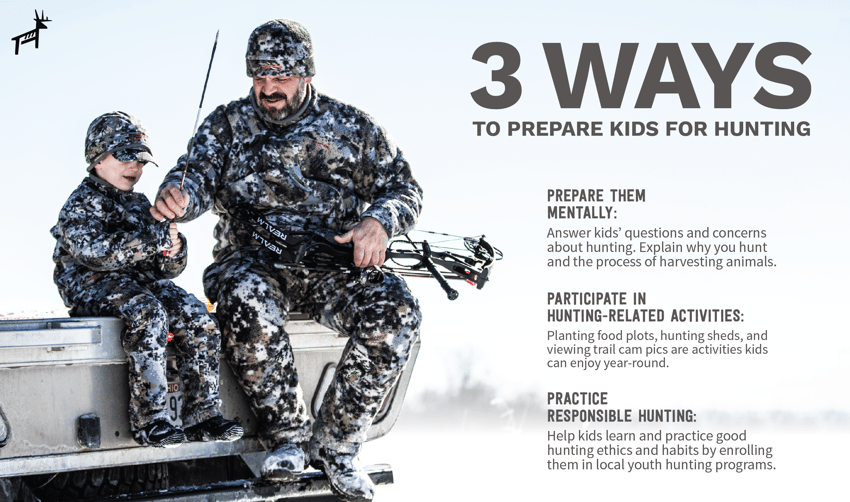
1. Prepare Children Mentally
Preparation is essential to helping a child understand and enjoy a new hunting experience—and a critical aspect of that is mental preparation.
“You can’t just take a kid from playing in the backyard to expecting them to sit quiet in a blind or watch an animal get shot,” Gene said. “There’s a lot of preparation that needs to happen before that.”
Let's cover two important parts of preparation that will help you know when and how to introduce children to the activity.
What Age is Appropriate for Hunting?
The age when a child or youth can legally carry a gun and shoot a big-game animal differs depending on where you live. Some states have no age limit. Others range from 10 to 16 years old and may include requirements about hunting as an apprentice or with a mentor. Many states also require a hunter safety course. Find out here what hunting age requirements your state has.
As with most things in life, knowing the right time to take your unique child on his or her first hunt is an individual decision. However, for many families the hunting tradition doesn't have a specific start date. It's simply ingrained in the family culture and passed down from generation to generation as part of everyday life.
So, even if your child isn't carrying or shooting, the overall hunting experience can be enjoyed at nearly any age! Consider introducing youth to fun hunting-related activities to start your own traditions. They're a great way to teach kids about safety, give meaningful education in the field, and help them gain valuable experience and appreciation for the outdoors.
How to Explain Hunting to a Child
Hunting is about so much more than just harvesting an animal. It's exploring, bonding with family and friends, appreciating nature and the wonder of mountains and woods and wildlife. Sharing your excitement for it and explaining the circle of life—such as nature's way of taking and giving, and when something dies, it gives life to something new—is a great place to start a conversation with children and even toddlers.
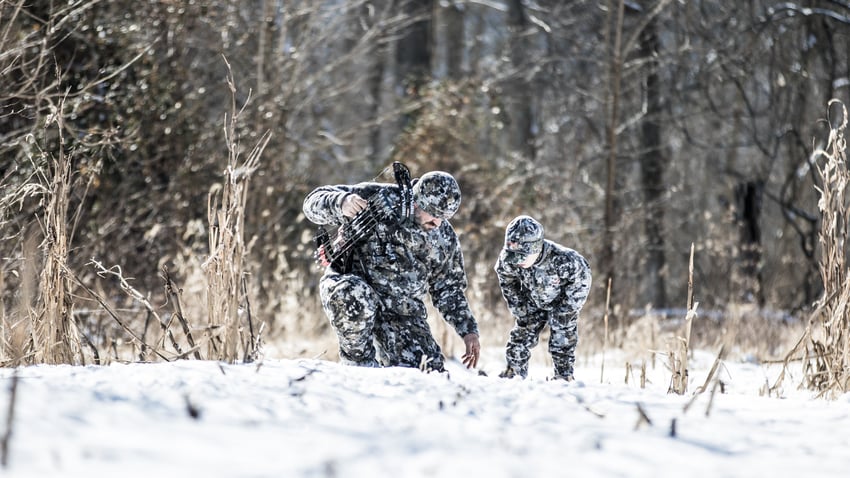
You'll also need to talk to kids about what actually takes place on a hunt. Tell them real-life situations. Explain why you hunt—whether for food, adventure, conservation, or trophies—and the process of harvesting wildlife. Carefully explain that you may shoot and kill an animal. Be clear about what you'll do with the meat. See how they react. Answer their questions. Do they seem receptive, interested? Or not?
“Some aren’t going to be,” Gene said. “Some can’t mentally get over seeing an animal harvested. They don’t understand it and they don’t want to be a part of it.”
And that’s okay. If your child isn’t receptive, don’t force it. Hunting may not be their thing. Or they may become interested as they experience other fun activities like the ones listed below.
2. Participate in Hunting-Related Activities
If you want your youth to appreciate every aspect of hunting, make it an active part of their life—not just something that happens once a year. For Gene and his family, there’s a lot of work involved in the lifestyle. Managing the land and a healthy deer herd is a year-round responsibility. It’s also one that provides opportunities for fun, teaching moments, and quality time together. Here are nine hunt-related activities you can participate in with kids year-round:
- Go out scouting. This is a great opportunity to give youth a firsthand glimpse at animals in the field. Activities might involve spotting animals, looking for food sources, identifying scat, or teaching about deer sign, like scrapes and rubs.
- Prepare mineral sites. Scoping out a site and putting out minerals on your land is a deer management responsibility that can also be a fun outing. (Need deer minerals? Stock up on natural Redmond Trophy Rock products.)
- Share trail cam pics. Kids dig animals! Take time to show them unique or funny shots and video you pick up on your trail cam.
- Plant food plots. It doesn’t get much better than climbing in a tractor with your little, taking care of the land and talking about deer.
- Go shed hunting. Who doesn’t love an outdoor treasure hunt? Searching for antlers is a fun expedition at any age.
- Watch a show. Queue up an outdoor TV series you and your kids can enjoy and talk about.
- Give em' a call. Pull out your deer, duck or other calls and let kids experiment making noises. Teach them which sounds belong to which animals.
- Re-create hunting scenarios. Spending time in a blind or canvassing your land helps children see animals up close and discover what a real hunt might be like.
- Help harvest animals. Teach that harvesting an animal is part of taking care of it. Encourage kids to help cook and eat harvested meat.
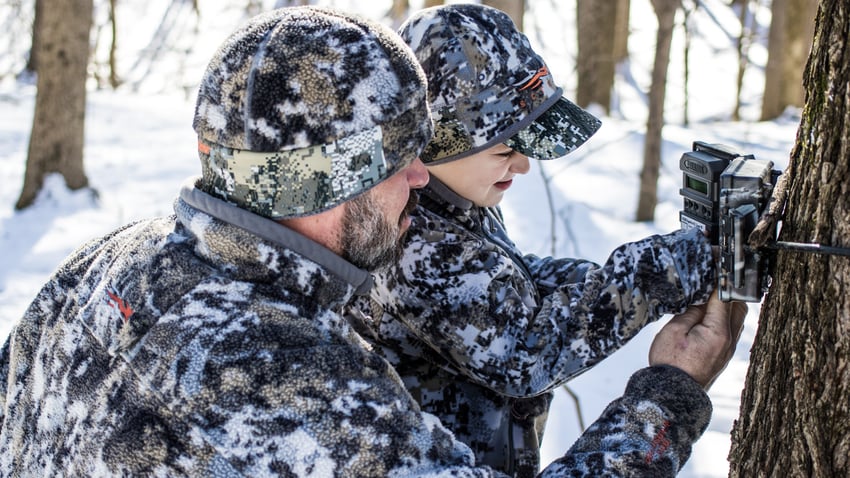
3. Practice Responsible Hunting
A child's most influential teacher when it comes to good hunting practices is the one who takes them out most. If that’s you, polish up your own ethics then help youth learn to be good stewards.
“Be very cautious around kids,” Gene advised. “Make sure you practice good habits and show respect for the land, animals, people, and your weapons. They will see your example and follow your footsteps.”
Teaching kids about responsible hunting doesn't need to rest solely on your shoulders, however. There are also great youth programs to prepare and educate children. Here are three education courses we recommend:
- National Archery in Schools Program: Teaches archery and ethics to youth in grades 4 through 12.
- 4H Shooting Sports: Teaches marksmanship, responsible use of firearms, archery principles, and helps develop life skills, self-worth, and conservation ethics.
- Hunter Safety Courses: Teaches responsible firearm handling, local laws and regulations, and game identification.
Remember, your role extends beyond the hunt itself. You're nurturing the future stewards of our wilderness abd shaping their values and practices. With good guidance, they can walk the path of respect, ethics, and responsible hunting, then pass it on to the next generation.
3 Lessons Kids Learn from Hunting
From preparing for their first hunt to bagging their first buck and beyond, youth can learn valuable life lessons from heading into the woods. It's a school of life, where you'll learn lessons that'll stay with you for a lifetime. Here are three Gene feels it teaches:
- Stewardship and Respect. A good hunter learns respect for the land, the critters that call it home, and to accept stewardship over both.
- Skills for Survival. Hunting is about survival, and the knowledge gained sharpens youth's instincts and resourcefulness. Whether they're hunting for food or sport, these skills prove valuable not just in the woods, but also the challenges life throws their way.
- Patience, Mastery, and Confidence. In a hunt, patience isn't just a virtue—it's a weapon. Youth learn to wait, to observe, and to strike at the right moment. It's a sport that requires diligence, discipline, and courage—all attributes that help grow self-confidence.
Reflecting on his grandson’s first successful deer hunt, Gene recalled the confidence in Carson’s voice after he made the successful shot.
“He just looked at me with this big grin and said, ‘I knew I could do it,’” Gene said. “That kind of confidence that comes from hunting can really grow a kid. When life challenges come up, they can reflect back on their experience harvesting an animal and know they can handle this situation facing them too. That’s why you take a kid hunting."
Watch a Redmond team member's 14-year-old son share thoughts and memories of his first big-game hunt!
Did you know taking kids hunting is a foundational part of Redmond's core values? Heritage, tradition, and passing it down is an integral part of why we hunt. Click below to find out what our other three values are.
© Redmond Hunt 2023. All rights reserved.


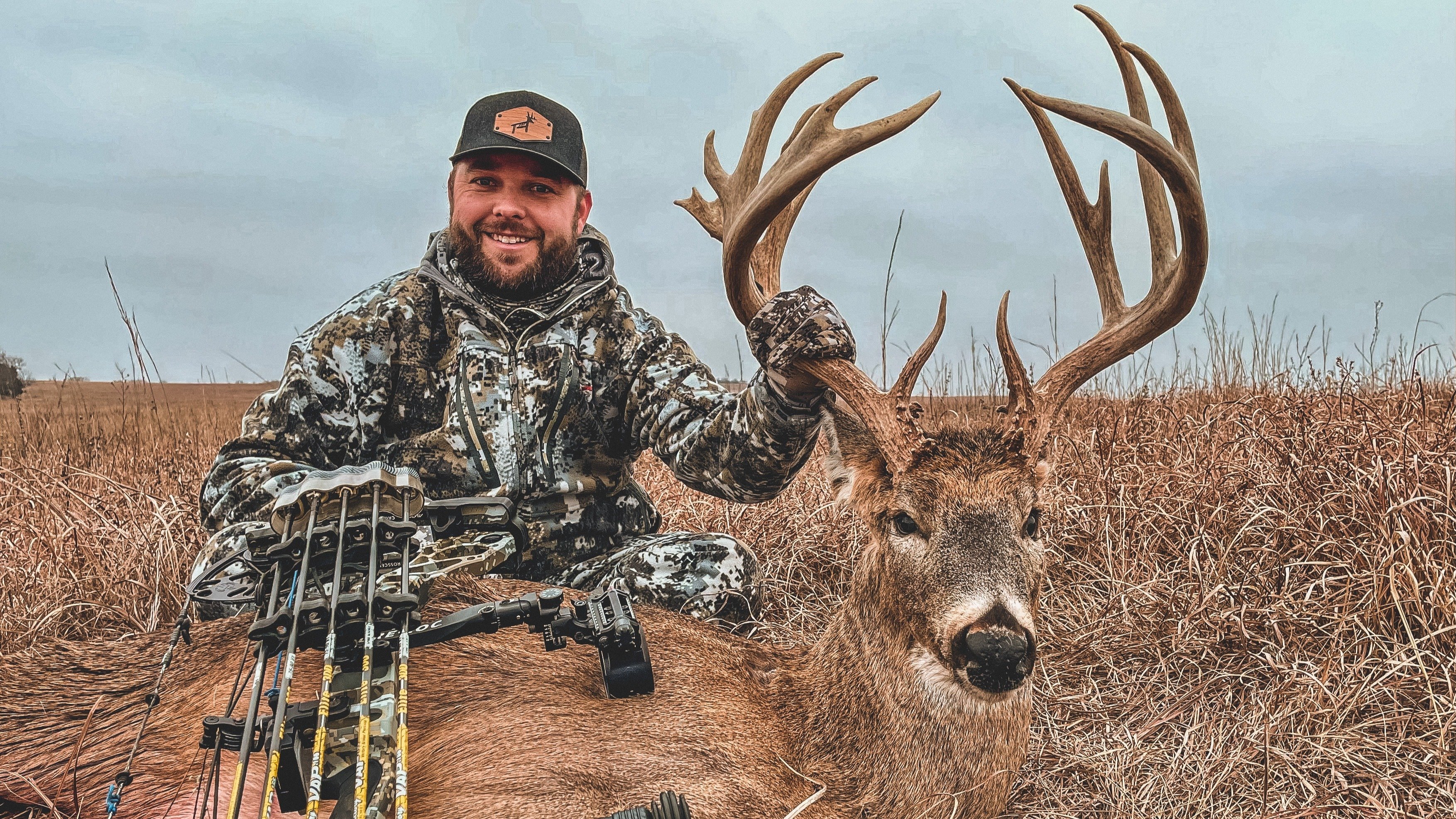
.jpg)
